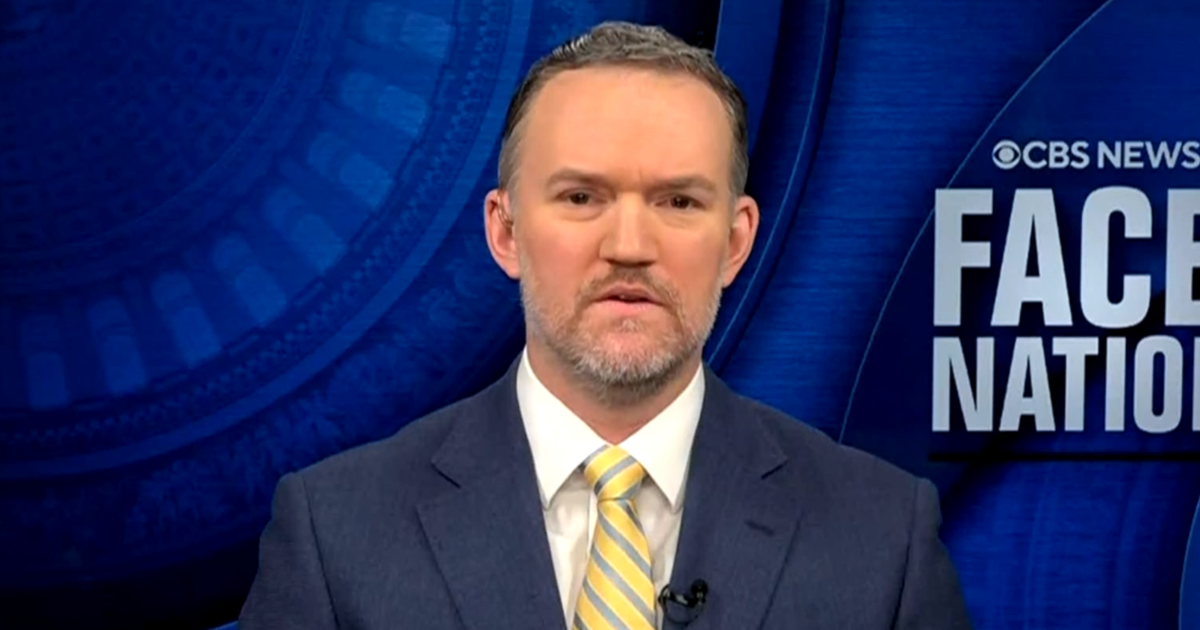Transcript: Daniel O'Day discusses coronavirus treatment on "Face the Nation," May 3, 2020
The following is a transcript of an interview with Gilead Sciences CEO Daniel O'Day that aired Sunday, May 3, 2020, on "Face the Nation."
MARGARET BRENNAN: Joining us now is Daniel O'Day, chairman and CEO of Gilead Sciences, that's the pharmaceutical company that makes remdesivir. Good morning to you.
GILEAD CEO DANIEL O'DAY: Good morning, MARGARET. Thank you for having me on.
MARGARET BRENNAN: So this drug shaves about four days off the recovery time of someone hospitalized with coronavirus, according to the government study. Now that your company has this emergency use authorization, how quickly will the drug get to those people who need it?
O'DAY: Well, you know, I think I speak on behalf of all of us at Gilead that we are grateful and really humbled that everything has moved so quickly. You know, it's only been three months since the first case was diagnosed in the United States to the emergency use authorization that was provided this past Friday. That's thanks to a lot of patients and caregivers that participated in our clinical trials. And we are now firmly focused on getting this medicine to the- the most urgent patients around the country here in the United States. And, MARGARET, we intend to get that to patients in the early part of this next week, beginning to work with the government, which will determine which cities are most vulnerable and- and where the patients are that need this medicine.
MARGARET BRENNAN: I think that's important. You're saying you've- you've donated some of this drug to the federal government, and you will work with the federal government to decide where the drug goes? Or is that up to the federal government to decide?
O'DAY: Right, MARGARET. So we've donated the entire supply that we have within our supply chain. And we did that because we acknowledge and recognize the human suffering, the human need here and want to make sure that nothing gets in the way of this getting to patients. And what we will do is- is provide that donation to the U.S. government and they will determine, based upon things like ICU beds, where the course of the epidemic is in the United States. They will begin shipping tens of thousands of treatment courses out early this week and be adjusting that as the epidemic shifts and evolves in different parts, in different cities here in the United States.
MARGARET BRENNAN: Okay- okay, well, we have more to talk about with you, but I have to take a quick break here. So stay with us, and stay with us, all of you as well, please. More with Daniel O'Day in a moment.
(COMMERCIAL BREAK)
MARGARET BRENNAN: I want to pick up on this, you said the- the supply of one and a half million doses of remdesivir has been donated to the government. That's enough for what, 150,000 patients or so?
O'DAY: Right, MARGARET. Just to be clear, what we've done is we've donated the entirety of our supply, which is around 1.5 million vials, and that turns into around 100,000 to 200,000 treatment courses depending on whether it's a five-day or a 10-day. And this donation will be made available to patients here in America and the United States and across the world as other regulatory decisions are taken for those countries.
MARGARET BRENNAN: This drug is clearly going to be in demand since it's the- the first sort of promising development we've had. You were at the White House, has the Trump administration talked to you at all about using the Defense Production Act to somehow mandate that you prioritize the U.S. market over foreign markets?
O'DAY: Yeah, let me say something on the supply and the demand, because, you know, I'm so proud to work with the scientists at Gilead that, you know, that quickly moved and mobilized themselves in January, long before we knew whether the medicine would be available, to increase the supply. This is a long supply process. It used to take around 12 months, and now it takes around six months. And because of the steps we took in January, we'll have significantly more supply in the second half of this year to serve the suffering and the human needs out there. We've been working very closely with the U.S. government and with other governments around the world. In terms of the allocation question, I think we're aligned with the US government to both serve the patients here in the United States and then to be able to also make sure, as a global company based here in the United States, that we can serve other countries around the world as well. We've had very good dialogues with the government and that's going well.
MARGARET BRENNAN: So they haven't talked to you about mandating the U.S. market be prioritized or taking it for the stockpile for example. You can still export it?
O'DAY: That's correct. We have been exporting for clinical trials and for compassionate use, thousands of treatment courses. An- and our collaboration with the government has been such that we've been very transparent with them here in the United States. And we have a good relationship on- on future allocation.
MARGARET BRENNAN: This drug you have to get through an I.V. right now, so it works for hospitalized patients. Will you develop other mechanisms? Does this ever become a pill someone can take at home?
O'DAY: Yes. It's important to note that this medicine is really right now for the most severe patients in the hospital, and it's given by I.V. either through a five-day treatment course or a 10-day treatment course, depending on the stage and nature of the patient. But our scientists have been working since earlier this year to say, are there other ways that we could deliver this medicine, potentially as Dr. Gottlieb mentioned, to earlier patients. And in order to do that, we're looking at formulations such as subcutaneous formulations that may be given outside the hospital setting and possibly an inhaled version. This medicine is not suitable for oral administration because of the way it's metabolized. But there are ways we can look at formulations potentially that would get us to earlier patients and patients outside the hospital setting. That research is still ongoing yet, hasn't yet read out. And we'll certainly keep you up to speed on that.
MARGARET BRENNAN: All right. We will be watching. Thank you very much, Mr. O'Day.
O'DAY: Thank you.



